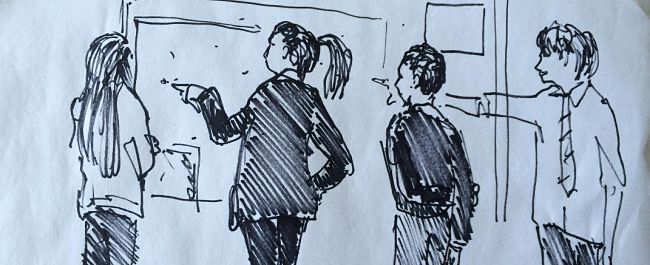Teenage Kicks: Cultural policy and practice needs to reflect the views, lives and ideas of young people

We must provide young people with an opportunity to voice their understanding of culture, who influences it and how and why they value it. This can help cultural policy makers to design a cultural offer that best meets young people’s needs.
About the research
The relationship between culture and young people today is complex. There is limited understanding of what young people perceive as culture and how and why they value it. There is public concern that young people, and in particular those from poorer and minority-ethnic backgrounds, are not participating in formal arts and cultural provision. There is also limited opportunity for them to voice their opinions regarding the cultural experiences on offer for them. Meanwhile, aspects of their cultural lives that they do enjoy, such as engagement with digital technologies, are often undervalued or poorly understood.
The research project ‘Teenage Kicks: exploring cultural value from a youth perspective’ has worked to give young people in Bristol a voice and understand their perspectives with regards to culture. Bringing together academics and cultural practitioners, it has examined the diverse forms of everyday cultural practice and participation of young people, such as the importance of home and family, and their nuanced use of digital technologies. It has sought to understand the ways in which young people make sense of and navigate culture themselves in real contexts and in relation to the provision available for them in their city. The project aims to draw out lessons to ensure that a cultural offer can be created that appeals to all young people.
Image © Joff Winterhart
Policy implications
- Young people’s opinions need to be incorporated into the formulation, practice, design, shaping and governance of culture at all levels.
- Programmes, policy and provision for children and young people need to take account of the diversity and importance of the everyday cultural experiences of young people within their home and family.
- Mechanisms need to be put in place to ensure schools provide a basic core cultural entitlement, drive access to high quality culture and cultural organisations, and support young people as cultural makers, shapers, doers and practitioners.
- The design, control and ‘feel’ of public space and the perceived formality of cultural institutions can leave young people feeling uncomfortable or culturally disenfranchised. Access to unregulated public and cultural space must be made available to young people in order for them to build rich social and cultural lives.
- For young people, ‘digital’ represents a fundamentally different way of engaging with and generating culture. Cultural organisations need to develop more nuanced and progressive digital strategies in response.
- In order to engage diverse groups of young people in cultural education and provision the barriers they face need to be identified and addressed. These include money, transport, physical access, and the ‘feel’ of buildings, public space and institutions.
Key findings
- Young people demonstrate a subtle and valuable understanding of the role, value and impact of culture in their lives. They describe how art and culture gives them access to different ways of knowing and expressing and can impact favourably on their health and well-being, particularly where they are given opportunities to produce and make culture as well as consume it.
- Home is a key site for positive cultural engagement for young people and is often where young people use digital technologies to develop, sustain and express their own identities and link to others. Family is also key in influencing ongoing engagement with culture.
- Although schools were found to be good at enabling access to cultural activities and organisations, the focus of the curriculum often negates the wider value of young people’s participation in cultural activities. The performative nature of the educational system can also act to box and restrict their active engagement.
- Young people speak highly of their participation in cultural practice where this takes place in less formal spaces, and where they are actively engaged in making, doing, shaping and acting as equal participants and as practitioners themselves. Adults play an important role in these spaces, providing young people with the support to pursue their cultural interests and engage with new ones.
- Through a myriad of digital technologies, tools and platforms many young people ‘curate’ their lives and their developing sense of culture in multi-layered ways. Digital, social and cultural activity and participation are therefore highly interconnected in young lives.
Further information
Researchers worked in partnership with the Real Ideas Organisation to recruit young people and cultural organisations from across Bristol: www.realideas.org
You can read the full paper: www.teenagekicksresearch.org
Policy Briefing 12: 2015
Teenage Kicks: Cultural policy and practice needs to reflect youth views (PDF, 168kB)
Contact the researchers
Dr Helen Manchester,
Graduate School of Education, University of Bristol:
helen.manchester@bristol.ac.uk
Authors
Dr Helen Manchester, University of Bristol
![]()